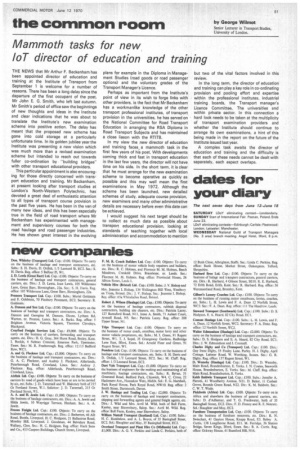the common room
Page 63

If you've noticed an error in this article please click here to report it so we can fix it.
Mammoth tasks for new loT director of education and training
THE NEWS that Mr Arthur F. Beckenham has been appointed director of education and training at the Institute of Transport from September 1 is welcome for a number of reasons. There has been a long delay since the departure of the first occupant of the post, Mr John E. G. Smith, who left last autumn. Mr Smith's period of office saw the beginnings of new thoughts and ideas in the Institute and clear indications that he was about to translate the Institute's new examination scheme into positive action. The delay has meant that the proposed new scheme has gone into cold storage at a particularly unfortunate time. In its golden jubilee year the Institute was presenting a new vision which was much more than a revised examination scheme but intended to reach out towards fuller co-ordination by "building bridges"' with other transport educational providers.
This particular appointment is also encouraging for those directly concerned with transport education and training. Mr Beckenham, at present looking after transport studies at London's North-Western Polytechnic, has devoted a great deal of enthusiastic attention to all types of transport course provision in the past five years. He has been in the van of many new ideas, and this has been especially true in the field of road transport where Mr Beckenham has experimented with management and supervisory courses for both the road haulage and road passenger industries. He has shown great interest in the evolving plans for example in the Diploma in Management Studies (road goods or road passenger options) and the voluntary grades of the Transport Manager's Licence.
Perhaps as important from the Institute's point of view in its wish to forge links with other providers, is the fact that Mr Beckenham has a workmanlike knowledge of the other transport professional institutes, of transport provision in the universities, he has served on the National Committee for Road Transport Education in arranging the RSA Diploma in Road Transport Subjects and has maintained a close liason with the RTITB.
In my view the new director of education and training faces a mammoth task in the first few years of his post. With developments coming thick and fast in transport education in the last few years. the director will not have time on his side. In the short term, it is clear that he must arrange for the new examination scheme to become operative as quickly as possible and this may well mean the first examinations in May 1972. Although the scheme has been launched, new detailed schemes of study, adequate course provision, new examiners and many other administrative details are necessary before even this date can be achieved.
I would suggest his next target should be to collect as much data as possible about transport educational provision, looking at standards of teaching together with local administration and accommodation to mention but two of the vital factors involved in this review.
In the long term, the director of education and training can play a key role in co-ordinating provision and pooling effort and expertise within the professional institutes, industrial training boards, the Transport manager's Licence Committee, The universities and within private sector. In this connection a hard look needs to be taken at the multiplicity of transport examination providers and whether the Institute should continue to arrange its own examinations, a hint of this being made in the report on the future of the Institute issued last year.
A complex task awaits the director of education and training and the difficulty is that each of these needs cannot be dealt with separately, each aspect overlaps.
























































































































